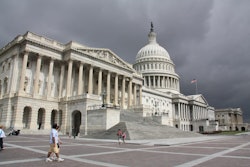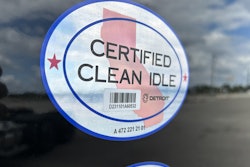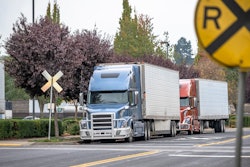
Environmental Protection Agency Administrator Lee Zeldin on Tuesday announced that his office plans to revoke the Endangerment Finding, which has allowed presidential administrations to regulate greenhouse gases since 2009.
Such a measure, if it passes, would wipe out Biden- and Obama-era greenhouse gas regulations, starting with EPA’s first standards set in 2010 for light-duty vehicles and those set in 2011 for medium-duty vehicles and heavy-duty vehicles and engines. It would also nix the Greenhouse Gas Phase 3 rule that was slated to take effect on 2027 model year heavy trucks.
“Let’s be clear, this move doesn’t help the trucking industry. It hurts it," said Craig Segall, former Deputy Executive Officer and Assistant Chief Counsel of the California Air Resources Board. "It penalizes fleets that have already committed to electric trucks and throws a wrench into long-term planning for businesses across the industry. It creates market instability just when we need certainty.”
While the GHG3 final rule didn't mandate battery electric technologies specifically, its requirement that 25% of new heavy trucks sold in the U.S. be zero emission by 2032 had been derided as a de facto electric truck mandate.
The adoption of heavy electric trucks in the U.S. last year was mostly flat compared to the year before, according to a report compiled by CALSTART published last month. Electric yard tractors have the greatest market share, accounting for roughly 2.82% of the total yard tractor fleet.
"Imagine investing in the future, only to have the rug pulled out from under you by your own government. That's the harsh reality for the fleets and manufacturers who invested in clean trucks, now penalized for their leadership," said Guillermo Ortiz, Senior Clean Vehicles Advocate for the Natural Resources Defense Council. "This is a gift to oil executives, a setback for American innovation, and a cruel continuation of the health burden placed on communities near ports, highways and distribution terminals."
Clean Freight Coalition Executive Director Jim Mullen called GHG3 "ill-advised" and "unattainable," while American Trucking Associations President and CEO Chris Spear, noting that over more than three decades truck emissions have dropped 98%, called GHG3 "disastrous." Both Spear and Mullen contend that GHG3's zero emission requirement put battery electric technology at the forefront at the expense of more widely available reduced-emissions solutions.
In its 2025 Operational Cost of Trucking report, the American Transportation Research Institute (ATRI) found the percentage of respondent fleets operating at least one Class 8 truck with an alternative energy system rose to 14.9% last year – more than twice as high as in 2021 (7%). However, compressed natural gas (CNG) remains the most-used technology, followed by liquified natural gas (LNG).
"Increased use of natural gas trucks supports U.S. energy dominance by expanding use of domestically produced conventional and renewable natural gas," The Transport Project said via statement. "Their increased use lowers criteria pollution and offsets greenhouse gas emissions. Despite these benefits and the rule’s stated purpose, Phase 3 actually discouraged significant emissions reductions achieved through the increased deployment of American natural gas trucks."
ATRI's report found that of the almost 15% of respondents who use alternative power, 96% of those trucks belong to just four carriers that each operate more than 1,000 petroleum diesel trucks. Alternative power makes up just 4% of ATRI's surveyed fleet and battery electric just .01%.
The repeal of greenhouse gas regulations is a long road that includes a lengthy rulemaking process and likely numerous legal challenges.
Something else potentially binding truck and engine manufacturers is the Clean Truck Partnership they signed with California Air Resources Board in 2023, but its validity is the subject of debate. Too, President Trump's dismantling of California’s vehicle emissions standards in June faces litigation.










